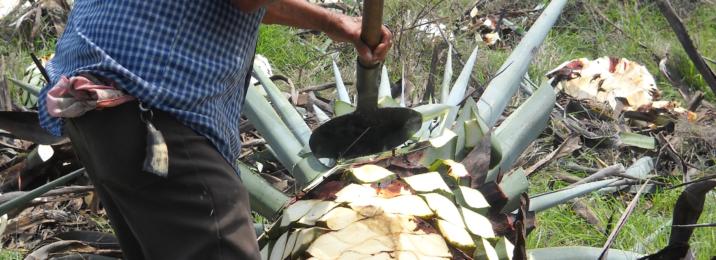Beyond Tequila: Alternative Agave Spirits To Know
Tequila has a bit of a bad reputation. Most popularly drunk at parties and taken as shots, the drink is often said to lead to destructive behavior. However, the tequila industry is working hard to shake off this perception and portray this alcohol as one of the more refined spirits to be enjoyed by connoisseurs too.
We’ve recently seen brands educating consumers about the nuances of this agave-based spirit, opening their eyes to its high-quality mixing possibilities as well as the flavors to be enjoyed when sipping the spirit. On the rise to popularity – along with tequila – is the more smokey agave spirit, mezcal. You might have already noticed its appearance on craft cocktail menus across the U.S. It is undoubtedly making consumers stand up and see the possibilities of agave beyond tequila.
Along with tequila and mezcal’s popularity, bartenders are also starting to stock their shelves with lesser-known agave alternatives. As with most trends, we have seen a peak in interest for these agave alternatives with American distillers considering their production. It seems an American-made agave movement is on its way.
In this article, we discover more about alternative agave spirits.
All About Agave
The agave plant is common throughout Mexico and the Southwest U.S., but hundreds of agave species can be found in many different regions worldwide. Not only good for making spirits, but the agave’s fiber can also be used for food, and the sap (aguamiel) can be made into nectar with a low glycemic index. The spirit is produced by the cooking, crushing, fermenting, and distilling of the agave plant.
Until recently, Sotol was listed in the agave family but is now classified in the Nolinaceae family. That means Sotol is technically not an agave spirit anymore.
Tequila
Tequila has become a national symbol of Mexico, and although it is popular with those looking to get drunk fast, premium tequilas also appeal to those with more distinguishing tastes. If you’re looking for a high-quality tequila, make sure it says 100% agave on the label – this means that no other sugars have been added.
Just like Champagne, Tequila is protected by an appellation of origin status. It can only be produced in the state of Jalisco and some municipalities in Guanajuato, Michoacan, Nayarit, and Tamaulipas from the blue agave or Agave Tequilana Weber plant. In these areas, the soil creates a sweet agave when distilled, while those grown elsewhere have a more herbal flavor.
Mezcal
Mezcal can be distilled from many different agave varieties like Espadin, Tobala, and Madre Cuixtle. Mezcal has a unique smokiness that comes about during production. The heart of the plant, known as the piña, is roasted in stone-lined pits, crushed, and then left to ferment with water in a barrel. Afterward, the liquid is distilled before being bottled or barrel-aged. You will enjoy flavors ranging from herbal and citrus to spicy and floral.
Mezcal can only be classified as such if made in Oaxaca, Durango, Zacatecas, San Luis Potosi, Guanajuato, Guerrero, Puebla, Michoacan, and Tamaulipas. It can, however, be made with any species of agave. The spirit is mainly produced in Oaxaca.
Tip: How to Drink Tequila and Mezcal
Many consumers debate the ‘correct’ way to shoot tequila, asking whether you should take the salt or lime first. But connoisseurs will say they don’t shoot a fine tequila or mezcal at all. Instead, it’s best to sip it alone or with sangrita (a mixture of tomato, orange juice, and lime juice, spiced with chili powder).
Raicilla
Raicilla is made similarly to mezcal. The hearts of wild agave are harvested, fire-roasted, mashed, fermented, and distilled. Raicilla was only legalized for import in the United States in 2014. Raicilla is made from the wild agave varieties – chico agar and maximilana – and it is sweet and has a tropical fruit-forward flavor.
Originating and only being made in Jalisco, specifically near and around the Pacific coast town of Puerto Vallarta, raicilla pre-dates conquistadors’ arrival.
Bacanora
Bacanora still has an ancient tradition to its production, from the wild agave pacifica. Workers harvest the agave’s piña, then roast it in volcanic rock-lined pits for two days, mash it up, then place it in air-tight cement pits with fresh water to ferment for one to two weeks. After this, it is distilled in a stainless-steel still several times. The flavor shows peppery spirit, with an earthy finish enhanced with pine nuts or almonds in the early stages of distillation.
From the north of Mexico, the mountain ranges of Sonora, the hot days, and cold nights in this climate create a dry yet complex drink.
Pulque
Pulque is made from aguamiel, the sweet raw sap that comes directly from the heart of the agave plant. Unlike tequila and mezcal, the spirit is not made from the distilled mash. Instead, the ‘honey water’ is extracted and then fermented to create a low alcoholic beverage. It is believed to date back over 1,000 years and even appears in stone carvings from 200 A.D. Pulque is milky in appearance, has a dense consistency, and a sour, yeast-like taste. It’s generally consumed on its own or in a curado, a drink made with fruit or nuts.
From central Mexico, pulque was considered sacred during the Meso-American period and was often consumed during ceremonial events.
As you can see, the agave spirits category is continuing to expand, and tequila is not the only agave spirit to buy anymore. Like a fine wine, the quality of the spirit, the lack of additives, and the terroir affect the spirit’s character. It’s what makes each agave spirit unique. Try sipping next time, and see what you can taste.
At Benito’s
Are you looking for great authentic Mexican cuisine and legendary agave spirits? Come to Benito’s in the Fairmount area of Fort Worth. Well known for our breakfast dishes, pico de gallo, fresh gauc, queso flamedo, and range of Mexican beers, tequila, and margaritas. You’ll experience true Mexican cuisine with us at Benito’sBenito’s.
To book a table, call us at 817-332-8633. To find out more, go to our website.






